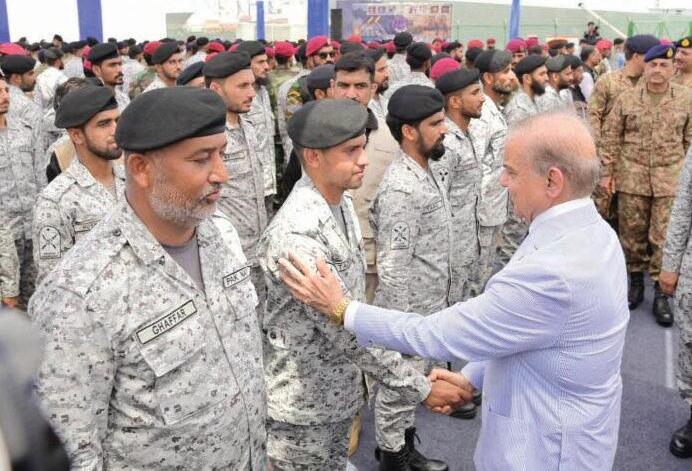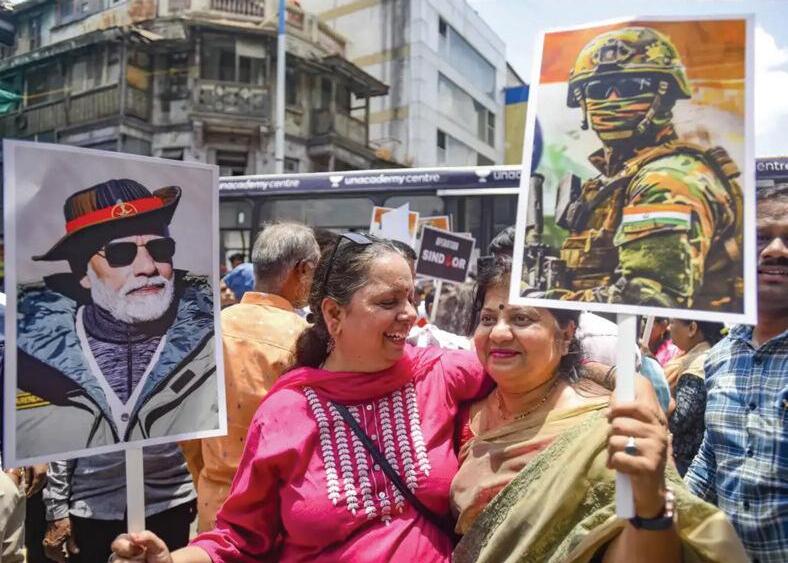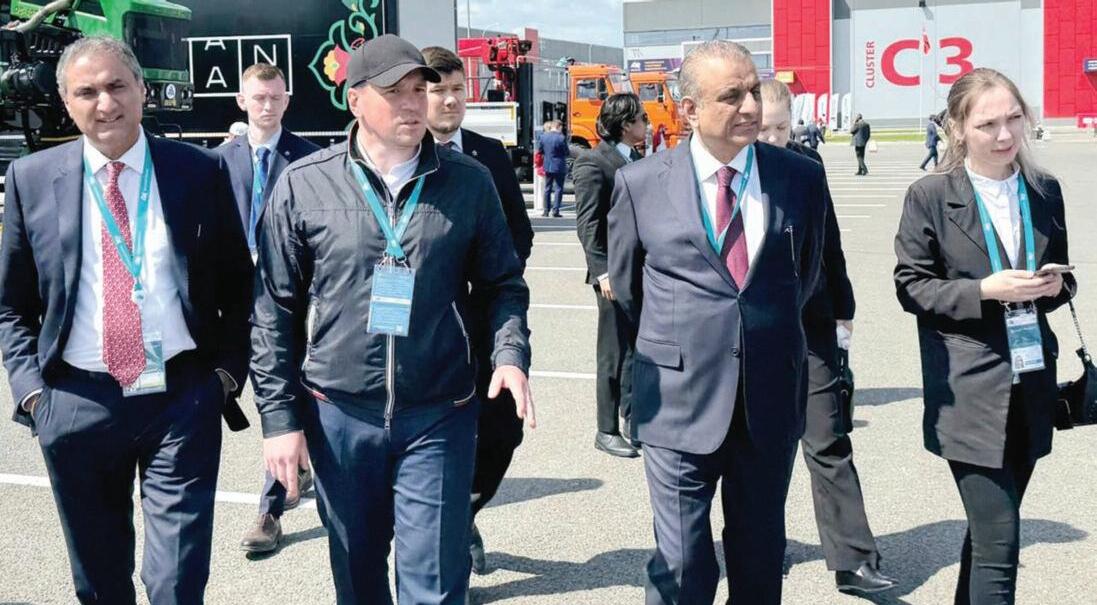

PM HAILS PAKISTAN NAV Y’S CRITICAL ROLE IN SAFEGUARDING SEA LINES OF COMMUNICATION


The sharp remarks come in the wake of India’s unilateral suspension of the decades-
Indus
Treaty last month following a deadly attack on tourists in Indian Illegally Occupied Jammu and Kashmir (IIOJK) which New Delhi blamed on Pakistan a claim Islamabad has categorically denied Since then, the region has once again been pushed to the brink In early May India launched a barrage of cross-border strikes not only across the Line of Control (LoC) but also into Pakistan s mainland claiming it was targeting militant hideouts Pakistan hit back, targeting 26 Indian military sites before a US-brokered ceasefire brought operations to a halt on May 10 However calm has remained fragile Indian Prime Minister Narendra Modi s declaration this week that India would cut off Indus waters flowing into Pakistan has reignited fears of escalation For Islamabad, such a move is tantamount to an act of war Separately, speaking with Arab News, DG ISPR cautioned that any move by India to block Pakistan s water would cross a red line It is some madman who can think that he can stop water of 240 million plus people of this country, he said
“I hope that time doesn’t come, but it will be such actions that the world will see and the consequences of that we will fight for years and decades to come Nobody dare stop water of Pakistan The DG ISPR revealed that India lost six aircraft, including French-built Rafales and a Mirage 2000, as well as a prized Russianmade S-400 air defence system during the four-day exchange Earlier reports had put the number at five but Prime Minister Shehbaz Sharif confirmed the sixth loss this week I can confirm that the sixth aircraft is a Mirage 2000,” Lt Gen Chaudhry said “We only targeted the aircraft We could have taken out more but we showed restraint he noted Looking ahead Chaudhry



KARACHI
M o n i to r i n g d e s k
The State Bank of Pakistan (SBP) has issued fresh guidelines to banks and Development Finance Institutions (DFIs) clarifying the regulatory treatment of Available-for-Sale (AFS) or Fair Value through Other Comprehensive Income (FVOCI) portfolios under the Basel III Capital Adequacy Framework The central bank s circular issued this week seeks to align CAR (Capital Adequacy Ratio) calculations with earlier communications including BSD Circular No 8 of 2006, an updated set of frequently asked questions (FAQs)
and a Pakistan Banks Association (PBA) letter dated July 2, 2024
Acknowledging the material impact of these changes on financial institutions’ capital positions the SBP has introduced a phased transition mechanism This will allow institutions to gradually reclassify their FVOCI portfolios from the Banking Book to the Trading Book in line with the following minimum thresholds: By December 2025: at least 25% of the FVOCI portfolio must be shifted to the Trading Book By December 2026: 50% minimum By December 2027: full reclassification (100%)
Banks and DFIs may choose to expedite this process and reclassify their holdings earlier, but they are not permitted to fall below the specified minimum thresholds in any of the defined periods
The SBP has also cautioned that any failure to comply with the new reclassification schedule may attract penal action under applicable laws and regulatory provisions All other previously issued instructions related to AFS/FVOCI treatment remain unchanged Institutions have been asked to acknowledge receipt of the circular and ensure full compliance with the transition plan The move is seen as part of the central bank’s broader efforts to enhance risk sensitivity and transparency within the capital adequacy framework for Pakistan s banking system
the initiative a new era in early disease diagnosis and prevention” and stressed the importance of modernizing Pakistan’s genetic research framework through targeted international cooperation A key component of the plan is the establishment of a national gene bank to benefit future generations, reflecting the country s long-term commitment to advancing its biomedical infrastructure To develop a clear collaboration strategy Dr Bharath tasked the NIH with taking the lead A technical team comprising two to three genetic health experts will be constituted to draft a comprehensive roadmap outlining Pakistan s research priorities and how best to leverage BGI’s expertise As part of the preparatory phase a Pakistani delegation is expected to visit BGI s research facilities in China The visit will focus on BGI s work in thalassemia reproductive health oncology and rare genetic diseases areas identified as strategic priorities for Pakistan s health sector Dr Bharath also welcomed BGI’s invitation for the visit viewing it as an important knowledge-sharing opportunity Following the technical consultations and field visits the government intends to formalize the partnership through a Memorandum of Understanding (MoU) Terming the collaboration a “transformative leap” for Pakistan’s biological sciences, Dr Bharath expressed confidence that this alliance would serve as a foundation for future advancements in personalized medicine genetic epidemiology and disease prevention
KARACHI n e w s d e s k The Pakistan Stock Exchange (PSX) witnessed a largely directionless session on Monday as the benchmark KSE-100 Index closed with a small nominal gain of 40 49 points or 0 03% ending the day at 119,689 63 The market oscillated between a high of 120,285 54 and a low of 119,250 67, spanning an intraday range of over 1 000 points reflecting investor caution amid a lack of fresh triggers Trading volumes for the KSE-100 stood at 119 5 million shares, while overall market activity also declined
with total volume dropping to 425 37

pared
Ttainable
Special Technology Zones by 2035 and to lift restrictions on the import
While
eral
were
and
(ITs)
to health and education spending, tax revenues, and the Tajir Dost scheme Despite these setbacks the IMF s report acknowledges progress in key areas and stresses the importance of continued reforms The Fund also highlighted that the successful resolution of pending litigation cases including those related to undercapitalized banks and


04
COMMENT
Climate crisis demands action
TH E recent fire in Islamabad’s Margalla Hills is a stark reminder of the vulnerability of our environment to the impacts of climate change As the country grapples with a devastating heatwave, the need for a coordinated response to mitigate the effects of climate change has never been more pressing
The fire, which was brought under control after a concerted effort by the Capital Development Authority and district administration officials highlights the importance of preparedness and swift action in responding to environmental disasters However it also raises questions about the government’s overall strategy for dealing with the challenges posed by climate change
The heatwave that has been affecting various cities, including Lahore, has brought the issue of climate change to the forefront Rising temperatures, increased frequency of extreme weather events and unpredictable weather patterns are all indicative of the devastating impact of climate change on our environment and economy
In this context the government s response to the crisis has been woefully inadequate The lack of a coordinated strategy to address the challenges posed by climate change is evident in the absence of effective measures to mitigate the impact of the heatwave The recent increase in electricity prices The government needs to take immediate action to address the root causes of climate change and develop a comprehensive plan to deal with its impacts
The fire in the Margalla Hills is a wake-up call for the government to take concrete steps to protect our environment and mitigate the effects of climate change This includes investing in disaster preparedness and response, promoting sustainable land use practices, and reducing our reliance on fossil fuels
As the country struggles to cope with the challenges posed by climate change, it is essential for the government to prioritize the well-being of its citizens and take proactive measures to address the crisis The people of Pakistan deserve a government that is committed to protecting their environment, economy, and future

Dedicated to the legac y of late Hameed Nizami Arif Nizami (Late) Founding Editor
M A Niazi Editor Pakistan Today Babar Nizami Editor Profit
TOn
6-9 Modi s
Guru-agenda and Hindutva-run madness led to adventure inside Pakistan and after an enduring restraint, Pakistan s comprehensive response came, which not only flabbergasted the Indians, but also the world that saw “Pakistan retaliated with a massive and relentless barrage of missiles and rockets targeting Indian military facilities airbases and weapons storage sites It forced India to seek help from the world India s military spokesperson in her briefing asked Pakistan to stop Nick Robertson, CNN’s Correspondent, reported live; “India reportedly sought assistance from US Saudi Arabia and Turkey ” To which Pakistan responded positively
The destruction was thus averted but it seems that the Indians have only gained time to stage another attack Defense minister Khwaja Asif warned India might attempt another adventure It means India is relentlessly hell bent upon bringing the region to the brink of an unthinkable catastrophe Thanks to Pakistan’s prag-
Pahalgam to Sindoor – The disguised legalit y
crux of India s allegations is that the incident in question was perpetrated by Pakistan-based terrorists (non-state actors) accompanied by recurring and explicit assertions of state sponsorship


LE T us begin by briefly examining some key facts On April 23 2025 a day after the terrorist attack at Pahalgam Indian Foreign Secretary Vikram Misri addressing a special press briefing following a meeting of the Indian Cabinet Committee on Security, remarked: In the briefing to the CCS, the cross-border linkages of the terrorist attack were brought out ” This was followed by the announcement of a series of measures including holding the Indus Waters Treaty in abeyance – until Pakistan credibly and irrevocably abjures its support for cross-border terrorism – and closure of the Attari–Wagah border Mr Misri further stated: It [the CCS] resolved that the perpetrators of the attack will be brought to justice and their sponsors held to account ” This statement marked the first unambiguous official attribution of the Pahalgam incident to cross-border involvement Notably, even before this official statement, Indian media was already ablaze with fingerpointing, mere hours after the tragedy On May 7, India launched ‘Operation Sindoor ’ , accompanied by an invocation of the right to self-defence Yet conspicuously absent until then and still missing was the presentation or public sharing of any evidence establishing either direct or indirect involvement by Pakistan Were India s actions justifiable under existing and established principles of international law? In the absence of such justification Operation Sindoor cannot be regarded as a lawful act of self-defence but rather constitutes a belligerent and unlawful use of force At this stage, a brief consideration of the broader discursive context is warranted While interspersed with varied rhetorical expressions, the central theme underlying statements – whether directly official, from officials on different platforms analysts and more generally expressed in the media in India –revolved around justice One can argue - as India can no doubt do - that the stated need or pursuit of justice does not of itself disqualify a military response from being classed self-defence The use of force in self-defence must, however, satisfy certain requirements Let us assess bearing in mind that the
The right to self-defence preserved under Article 51 of the UN Charter is triggered only if an armed attack occurs Over the first part of this century, the law in this area particularly concerning non-state actors, under what is labelled as the “unwilling or unable” doctrine, and evolving attribution standards has become increasingly controversial and difficult to navigate with certainty That said under both traditional and emerging doctrines the actions of non-state actors can especially when there is compelling evidence of state sponsorship potentially qualify as an armed attack
Let us assume, solely for the purposes of legal analysis and while expressly acknowledging Pakistan’s firm and unequivocal denials of any connection to the perpetrators or of any state sponsorship that the Pahalgam incident did in fact amount to an armed attack Is then responsive action in self-defence, whether immediate or deferred, legally unfettered? It is not Any use of force in selfdefence, especially when directed at or within the territory of the state alleged to be responsible must still comply with the core principles of necessity immediacy and proportionality
Necessity and immediacy require a temporal nexus i e the armed attack is feared to be first in a series of imminent threats India claimed that the strike of May 7 – eventually unravelling as the ‘opening act’ of Operation Sindoor – was in fact proportional While that claim in itself is unpalatable
given the loss of civilian lives including innocent children – what is fundamental is that there was no evidence of any imminent threats post Pahalgam No statements to this effect were made and neither was this India’s stated reason for undertaking eventual military action Indian Parliamentarian and noted commentator Shashi Tharoor stated in an interview that our job is to teach them a lesson and wash our hands of the matter that s the idea of what our strike is all about India s press brief of April 23 would have suggested to any reasonable audience that clearly India had tangible and credible threshold proof Perhaps they had the identity of the perpetrators or irrefutable confirmation of Pakistan sponsorship or at least independent substantiation of involvement of non-state actor elements within Pakistan Such an assumption was absolutely warranted objectively, given India s announcement of unprecedented measures against Pakistan Afterall, they had acted to water-starve a nation which itself has an international humanitarian dimension in and outside of war Pakistan and indeed the world waited but other than high-octane fuelled rhetoric of justice marked by a persistent conflation of moral imperatives and strategic objectives intermixed with historical blame pasting, nothing


The
On May 6-9, ModiÊs Vishwa Guru-ag enda and Hindutva-run madness led to adventure inside Pakistan and after an enduring restraint, PakistanÊs comprehensive response came , which not only flabbergasted the Indians, but also the world that saw „Pakistan retaliated with a massive and relentless barrag e of missiles and rockets, targ eting Indian militar y facilities, airbases, and weapons storag e sites.‰ It forced India to seek help from the world IndiaÊs militar y spokesperson in her briefing asked Pakistan to stop Nick Rober tson, CNNÊs Correspondent, repor ted live; „India repor tedly sought assistance from US, Saudi Arabia and Turkey ‰ To which Pakistan responded positively
Four visits later
the TC is signed and handed over Four visits and bundles of irrelevant photocopies of documents already held by the government comprise the standard operating torture (SOT) for ordinary citizens to obtain routine government services Pakistan ought to treat its citizens with respect, eliminate all visits to government offices and learn how the world has linked all government services to avoid endless submission of photocopies
NAEEM SADIQ KARACHI
Rivers and rivalries
RAHUL Gandhi s recent statement that Narendra Modi has unintentionally united Pakistan and China is not just a political jab, but a warning rooted in strategic realism His reference to Kargil and Ladakh highlights a shifting geopolitical triangle where water defence as well as diplomacy are increasingly interlinked India s repeated threats to revoke or undermine the Indus Waters Treaty not only breach international conventions, like the Helsinki Rules and the United Nations Watercourses Convention but also provoke regional instability China, as the upper riparian of five major rivers flowing across South Asia, could adopt similar tactics in retaliation, jeopardising India’s eastern and northern regions The growing military and intelligence cooperation between Pakistan and China through China-Pakistan Economic Corridor (CPEC), the JF17 project and satellite coordination, further complicates India s strategic calculus Meanwhile the inter-national community has often remained largely silent despite India’s unilateral moves and rulings by global arbitration bodies in Pakistan s favour If this attitude continues, water could become the new weapon of war in South Asia replacing diplomacy with deterrence The Modi government must realise that sustainable regional peace lies not in coercion,



nant of inflation especially in developing countries like Pakistan that neither have deep financial sector nor is per capita income so high that people can purchase otherwise expensive imported products
Hence, lack of emphasis on curtailing the cost-push and imported inflationary channels in turn leading to need for all the more growth sacrifice to at most short-term reduction in inflation given economic institutional determinants on the supply side are not improved, that neither allow much-needed increase in import substitution, nor lead to meaningful enhancement of exports, which overall means that as soon as austerity policies are curtailed the economy starts to heat up resulting in enhancement of the twin deficit This ultimately over a long period now has kept the country in a frequent boom-bust cycle
Therefore, economic growth for most of the last many years has been stuck in a low growth equilibrium; hovering around the population growth rate of around 3 percent
The recent over-board austerity policies have meant that economic growth is hardly going to make any significant comeback over the next two years Hence, the Report highlights in this regard ‘In Pakistan, GDP [Gross Domestic Product or simply national income] grew by 2 5 percent in FY23/24 after a small contraction in FY22/23 Economic growth is projected to continue gradually gathering strength, rising to 2 7 percent in FY24/25 and 3 1 percent in FY25/26 Similar projections for real GDP have been given by the International Monetary Fund in its May 9 press release whereby for the current- and next fiscal years it stood at 2 6 percent and 3 6 percent respectively

Lower economic growth, in turn, negatively impacts tax collection for both sides of income- and consumption taxes At the same time the Report rightly highlights the country s commitment with the IMF in the current Extended Fund Facility (EFF) programme that it is going to significantly increase tax as a percentage of GDP over the course of the 37-month EFF programme, which began in the last week of September
compared with other EMDEs with similar tax rates in all categories of taxes ’ While the Report highlights important aspects of the tax situation in the country it does not highlight the impact of over-board austerity policies as one of the main reasons for lower tax collection, which significantly impact economic growth, and taxation in a negative way
This is because over-board application of both monetary and fiscal austerity policies disproportionately impact economic growth in a negative way given it reduces inflationary pressures by over-squeezing aggregate demand, while little focus is given on removing bottlenecks that hamper aggregate supply, which is at least equal determi-
m
ov e r a l l i n c r e a s e i n t h e a g g r e g a t e s u p p ly o f t h e c o u n t r y. H e n c e , t h i s l o p s i d e d t a x a t i o n p ro d u c e s i n g e n e r a l h a rd s h i p fo r t h e p e o p l e , w h i l e c o n s u m p t i o n - b a s e d t a x a t i o n i n c r e a s e s t h e p r i c e o f i n t e r m e d i a r i e s , w h i c h n o t o n ly n e
Trump is transac tional. He favors countries that invest in the US, like S audi Arabia, Qatar, and the UAE , which just signed lucrative deals this week He prefers par tners who bring money to Americ a over those seeking Americ an funding
O n S eptember 30, 2027, the c urrent memorandum of understanding under which Israel receives $3 8 billion annually in US militar y aid will expire


IEN 2008, the United States Congress codified into law America s longstanding commitment to maintaining Israel’s qualitative military edge requiring the president to continually assess whether that superiority is being preserved
The legislation defines QME as the ability to counter and defeat any credible conventional military threat from any individual state or possible coalition of states or from non-state actors, while sustaining minimal damages and casualties through the use of superior military means possessed in sufficient quantity
Over the years there have been ups and downs but for the most part Israel s QME has been maintained When Saudi Arabia, for example, wanted to purchase F-15 fighter jets in the late 1970s, it received models slightly less advanced than those provided to Israel When Egypt bought F-16s the story was the same
This policy continued for years: Israel would receive one version of a system while its neighbors would get a slightly downgraded variant, perhaps with a less sophisticated radar or electronic warfare suite Some countries were sold jets that couldn’t be fitted with specialized systems while Israel received approval to install its own unique modifications
Though not always smooth the QME principle was largely upheld – until this week which ended with growing concern in Israel over the implications of massive new arms deals signed by the United States with both Saudi Arabia and separately Turkey Among the advanced weapons that reportedly could be included in the packages is the F-35 an aircraft currently operated in the Middle East solely by the Israel Air Force The F-35 is no ordinary fighter jet As a fifth-generation multirole combat aircraft with stealth capabilities, it functions as a networked system connecting all participating aircraft and enabling unprecedented interoperability
This applies not only among Israeli jets but also between allied forces operating in the same theater Now imagine Turkey receiving the F-35 Yes Turkey is a NATO member but it is also led by Recep Tayyip Erdogan, a leader who just a few weeks ago openly called for Israel s destruction Would Israel feel secure knowing that a country whose leader seeks its annihilation is now flying the world’s most advanced combat jet?
This brings us to another pressing issue On September 30, 2027, just over two years from now, the current memorandum of understanding under which Israel receives $3 8 billion annually in US military aid will expire The 10-year, $38b The agreement was signed in 2016 by then-President Barack Obama though it only went into effect after Trump began his first term At the time there was a debate in Israel over whether to finalize the MOU with Obama or wait and see whether Trump or Hillary Clinton would win the election Netanyahu ultimately chose Obama for one simple reason: He knew what he was getting While he was fairly confident Clinton would strike a deal Trump was an enigma With his America First policy, Israeli defense officials feared that securing a generous MOU under Trump might prove more difficult Fast forward to 2021, under President Joe Biden Although six years remained in the existing MOU some in the Israeli government pushed to begin talks on a new one The rationale was straightforward: Biden was a known quantity, a proven supporter of Israel, and could be counted on to offer a deal equal to or even better than Obama’s Then-defense minister Benny Gantz initiated quiet discussions with the Pentagon and the Biden administration But those efforts were cut short when the Bennett-led government collapsed after just a year When Netanyahu returned to power, his government did not prioritize renewing the MOU By the time it was ready to begin negotiations October 7 had happened Now practically speaking any new MOU will have to be negotiated with Trump The question is: Can Israel get it done? If so it must start working on it now Opinions within the Israeli government are divided Some believe Trump will agree to a new MOU and that especially now with the QME under threat this presents an opportunity to secure an even larger aid package for a longer period There is no question that support exists in Congress The main hurdle will be the Trump administration itself But others are skeptical Trump is transactional He favors countries that
invest in the US, like Saudi Arabia, Qatar, and the UAE which just signed lucrative deals this week He prefers partners who bring money to America over those seeking American funding That may explain why Netanyahu told the Knesset Foreign Affairs and Defense Committee this week that it might be time for Israel to start weaning itself off US military aid If Netanyahu were confident that the aid would continue why suggest moving away from it especially at a time when Israel s defense needs are only growing? If however he suspects the aid won t be renewed, it would be politically smart to claim the decision was his rather than admit that Trump denied it There are legitimate arguments for phasing out American military aid: diversifying weapons suppliers boosting domestic defense manufacturing and enhancing strategic independence But such a shift must be part of a comprehensive and deliberate strategy This isn t something to decide impulsively, especially amid the current chaos Israel is still at war It is working to bring home the remaining hostages It’s being sidelined in regional diplomacy And it now faces a genuine threat to its QME And if that were not enough on Wednesday we witnessed the historic meeting in Riyadh between Trump and Syria s jihadist-turned-statesman, Ahmed alSharaa Looking at the images, it was hard not to ask: What if? What if Israel had managed the Gaza war differently – secured a hostage deal when it was possible ended the fighting sooner and advanced a political resolution that would install a new governing entity in Gaza? Would Netanyahu have been in that room with Trump, Saudi Crown Prince Mohammed bin Salman, and Sharaa (with Erdogan joining by video)? Could Israel have been part of a historic normalization with Saudi Arabia and perhaps even the beginnings of a diplomatic process with Syria? Would

IRAN SAYS WILLING TO JOIN REGIONAL NUCLEAR FUEL CONSORTIUM


President Xi Jinping has emphasized the importance of sound democratic and law-based decision-making to ensure that China s next five-year plan for national economic and social development is formulated with high quality
Xi, also general secretary of the Communist Party of China (CPC) Central Committee and chairman of the Central Military Commission made the remarks in a recent instruction on the work concerning the compilation of the 15th Five-Year Plan (2026-2030)
Xi noted that the scientific formulation and consistent implementation of five-year plans stand as an important piece of experience in the CPC s approach to governing the country
The formulation and implementation of the 15th Five-Year Plan holds immense significance

for fully realizing the strategic initiatives outlined at the 20th CPC National Congress and advancing Chinese modernization, Xi said He emphasized the importance of integrating top-level design with seeking advice from the public enhancing research and discussions and building broad consensus Starting in 2026 China will begin implementing the 15th
WASHINGTON
A G E N C I E S
In a rare display of bipartisan support
from nationalist President Andrzej Duda Anti-communist icon Lech Walesa, who in 1990 became Poland’s first democratically elected president since World War II, said the election was a “chance to restore order in our country” This is a time of big discussions over the future of Poland Europe and the world he was quoted by Poland s PAP news agency as saying Turnout was 50 69 percent at 5:00 pm higher than the 47 89 percent at the same time in the first round of the last presidential election in 2020 The electoral campaign in Poland a member of both the European Union and NATO has largely revolved around foreign policy showcasing a clash of philosophies over Poland s engagement with the EU and the United States But social issues have also played a major part
former President Donald Trump has offered heartfelt wishes for Joe Biden s health after the current President of the United States was diagnosed with aggressive prostate cancer
Denmark s sovereignty and territorial integrity on the Greenland issue and hopes that Denmark will continue to support China’s legitimate position on issues related to China’s sovereignty and territorial integrity Wang said China is also willing to work with Denmark to adhere to two-way opening up take green development as the key point to give new impetus to practical cooperation, and continue to deepen cooperation in fields including economy trade scientific research and innovation and green economy Wang said
Noting China is committed to expanding high-level opening up to the outside world which will create broader development space for foreign-funded enterprises, Wang welcomed Danish enterprises to invest and start businesses in China and expressed hope that Denmark would provide a fair transparent and non-discriminatory business environment for Chinese enterprises
Wang called on both China and Denmark to strengthen people-to-people and cultural exchanges and continuously accumulate positive energy in bilateral relations through people-to-people friendship Noting that this year marks the 50th an-
Five-Year Plan for economic and social development
Currently the CPC Central Committee is organizing the drafting of proposals for this plan, and relevant departments are gearing up to solicit opinions and suggestions from officials the general public as well as experts and scholars through various channels in the near future

niversary of the establishment of diplomatic relations between China and the European Union and that Denmark will hold the rotating presidency of the EU in the second half of the year, Wang said China is willing to strengthen dialogue and cooperation with the EU and jointly promote the sound development of China-EU relations
As 2025 marks the 80th anniversary of the founding of the United Nations Wang said China and Denmark which began to assume responsibilities as a non-permanent member of the UN Security Council in January, have broad consensus on common challenges such as upholding multilateralism and defending free trade
He said China is willing to enhance coordination and cooperation with European countries, including Denmark, jointly safeguard the international system with the UN at its core and the multilateral trading system with the World Trade Organization at its core and contribute to world peace stability development and prosperity For his part Rasmussen said the people of Denmark and China have a history of friendly exchanges of over 300 years, noting that this year, the two countries will celebrate the 75th anniversary of the establishment of diplomatic relations Firmly committed to the one-China pol-
icy the Danish government and parliament are willing to strengthen high-level exchanges with China enhance dialogue and mutual understanding in various fields, deepen mutually beneficial cooperation in areas such as investment and green transformation, intensify people-to-people and cultural exchanges and promote the sustained and strong development of bilateral rela-
tions Rasmussen said He said Denmark holds an open attitude toward Chinese enterprises investment in Denmark and that Danish enterprises are also willing to make long-term investments and deeply cultivate the Chinese market Rasmussen added that Denmark is willing to play a promoting role in the healthy development of EU-China relations



to supporting BISP's social protection initiatives He emphasized that the Sindh government would continue to actively partner with BISP to ensure the success of its programs

CM MARYAM NAWA Z APPROVES DISTRICT ANNUAL DEVELOPMENT PROGRAM OF 12 DISTRICTS

Air ambulance ser vice to be introduced on motor ways soon: Abdul Aleem K han
KAZAN TATARSTAN S TA F F R E P O R T Federal Minister for Communications Abdul Aleem Khan has stated that efforts are currently underway to introduce Air Ambulance Service on Motorways and National Highways across the country He added that this facility is aimed that to ensure that those injured in traffic accidents can be transported to hospitals in the shortest possible time Federal Minister Abdul Aleem Khan expressed these views during his visit to the Expo Center following the conclusion of the Kazan Forum at Tatarstan Federal Minister pointed out that Kazan s development model is highly impressive and offers valuable insights that can be adopted across various sectors in Pakistan He highlighted the efficiency of Air Ambulance Service in Kazan noting that such initiatives could greatly aid Pakistan in establishing similar services fostering mutual learning and experience-sharing between the two countries Abdul Aleem Khan emphasized that the

high mortality rate resulting from road accidents during travel is a matter of serious concern and it is the Government’s responsibility to ensure that the injured ones are promptly transported to nearby medical facilities He added that continuous improvements are being made in Pakistan s transportation infrastructure and efforts are underway to raise public awareness about e-tagging and other automated facilities Federal Minister for Communications Abdul Aleem Khan described the Kazan Forum as beneficial for

Pakistan, particularly in the context of advancements in the Communications Sector through collaboration among participating countries He underscored the importance of enhancing land connectivity from Pakistan to Central Asian States and mentioned that productive discussions took place on this front during the Kazan Forum In their visit to the Expo Center, Kazan Federal Minister for Communications Abdul Aleem Khan and the Pakistani delegation were briefed on the operational procedures and supporting infrastructure of Air Ambulance Service





Deputy Prime Minister and Foreign Minister Ishaq Dar arrived here in Beijing on Monday for a three-day official visit The visit is taking place at the invitation of Chinese Foreign Minister Wang Yi The diplomatic trip comes amid heightened regional tensions following last week s ceasefire between Pakistan and India The ceasefire followed a military standoff linked to the Pahalgam attack in Indian Illegally Occupied Jammu and Kashmir (IIOJK) which India attributed to Pakistan although no conclusive evidence has been presented China lent unwavering support to Pakistan when India launched missile strikes targeting Pakistani civilians under the garb of eliminating so-called terror camps It is widely believed that China worked closely with Pakistan throughout the crisis, providing critical mili-
tary as well as diplomatic support to deter India
China publicly backed Pakistan and sent a clear message that it supports Islamabad to safeguard its territorial integrity and sovereignty The four-day conflict proved immensely beneficial for China whose J-10C fighter jets and PL-15 missiles helped Pakistan down six Indian fighter jets, including highly-advanced French made Rafale
Before departing for Beijing, DPM Ishaq Dar reaffirmed the strong trade and diplomatic relationship between Pakistan and China Associated Press of Pakistan reported Dar noted that he had held two recent telephone conversations with Chinese Foreign Minister Wang Yi who extended the invitation for the official visit
He said his meetings with Chinese leadership would cover a broad range of topics, including political, regional, and global is-
sues as well as the recent tensions between Pakistan and India
Referring to his discussions with foreign counterparts worldwide, Ishaq Dar stated that these interactions have revealed attempts by India to shift blame onto Pakistan including allegations related to attacks on nuclear installations
During the visit the Foreign Office said Dar will hold in-depth discussions with Wang on the evolving regional situation in South Asia and its implications for peace and stability
The two sides will also review the entire spectrum of PakistanChina bilateral relations and exchange views on regional and global developments of mutual interest
The visit forms part of the ongoing high-level exchanges between Pakistan and China It also underscores the two countries shared commitment to further strengthen the All-Weather Strategic Cooperative Partnership”, the statement said
Pakistan, US explore deeper strategic and economic cooperation in L A
India of exploiting the Pahalgam attack as a pretext to undermine the Indus Waters Treaty a crucial accord that has helped manage cross-border water flows since 1960 Abbasi urged the international community to uphold its responsibility in ensuring India s compliance with the treaty “Violation of this agreement will not only provoke conflict but destabilize the entire region,” he cautioned In a significant announcement regarding national defense coordination Abbasi revealed that Pakistan Railways had been placed under the full operational control of the armed forces Whenever needed, the military will utilize the railway network for transporting weapons, equipment, and personnel The railway system is now an integral component of our national security infrastructure ” he said

